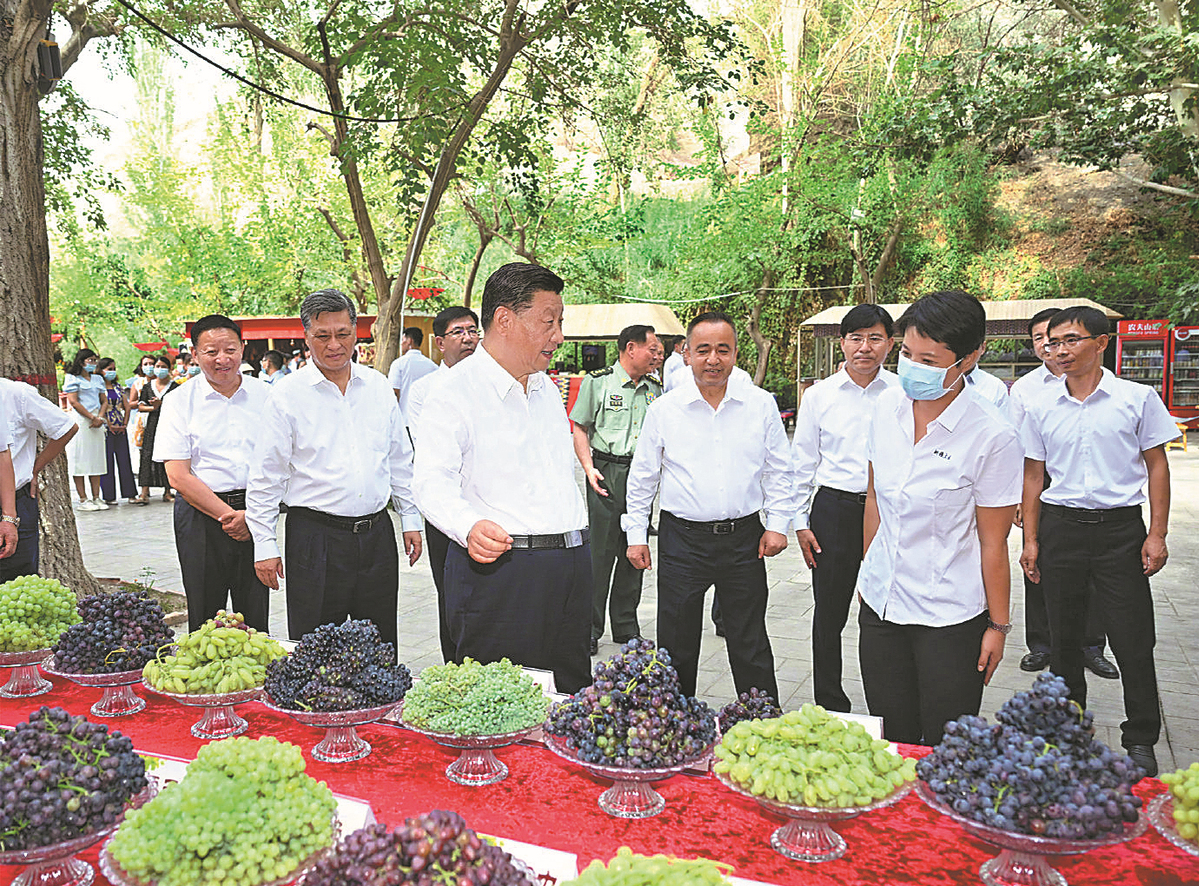President Sets Out New Vision for Xinjiang

President Xi Jinping, who is also general secretary of the Communist Party of China Central Committee and chairman of the Central Military Commission, visits Turpan in the Xinjiang Uygur autonomous region on Thursday. LI XUEREN/XINHUA
President Xi Jinping has outlined a new vision for the development of the Xinjiang Uygur autonomous region, highlighting the need to develop a strong sense of the Chinese nation as one big family and to build up unity among various ethnic groups.
Xi, who is also general secretary of the Communist Party of China Central Committee and chairman of the Central Military Commission, made the remarks during a four-day fact-finding trip to the westernmost region of China, beginning on Tuesday.
The trip, his second to the region in eight years, took him to Urumqi, the regional capital, as well as to Shihezi and Turpan. He visited a university, schools, an international land port, communities, museums and the Xinjiang Production and Construction Corps.
During a meeting with regional officials on Friday, Xi underlined that support from the people is the most important factor in ensuring the long-term stability of the region.
He urged various sectors of Xinjiang to unite and look to the future in order to maximize the efforts of officials and the people in ensuring stability, seeking growth and promoting reform, saying that the authorities should give priority to heeding advice from various sectors of society.
In building up the sense that the Chinese nation is one big family, the president said that exchanges, communication and integration between different ethnic groups must be promoted.
Chinese civilization is the root of the cultures of all ethnic groups in Xinjiang, and more work must be done to educate and guide officials and the general public to put the history of Xinjiang and their ethnic groups in the right perspective.
He called for measures to enable the people of various ethnic groups to remain closely united like the seeds of a pomegranate that stick together, bolstering their integration in daily life and work, as well as culturally, economically, socially and psychologically.
The president stressed the need to improve governance capacity related to religious affairs and to enable the healthy development of religions in Xinjiang, a region with a population of 25.85 million in 2021, of which close to 58 percent are from non-Han ethnic groups, and are mostly Muslims.
Xi said the principle that Islam in China must be Chinese in orientation must be upheld to adapt the religion to Chinese socialist society.
It is important to foster a group of religious clergy who are politically reliable, accomplished in religious studies, widely respected and can play a role during critical periods, he said.
He highlighted the need to guarantee the normal religious needs of believers and to unite them closely around the Party and government.
More work must be done to guide various ethnic groups to develop a correct view of the nation, history, ethnicity, culture and religion, and to build up their level of recognition of the motherland, the Chinese nation, Chinese culture, the Party and socialism with Chinese characteristics, he said.
The president called for steps to enable the outcomes of growth to better benefit people's well-being, saying that the high-quality development of the economy must be accelerated and industries with local advantages must be strengthened in order to create more jobs.
The outcomes of poverty alleviation and the rural vitalization strategy must be better aligned to improve the long-term mechanism for sustainable development in rural areas, he said.
Xi urged the region to prioritize ecological protection and green development and to adopt a holistic approach to conserving mountains, rivers, forests, farmlands, lakes and grasslands and the treatment of deserts.
The region must scale up its level of opening up, develop itself as a gateway for China's opening-up in the west and move forward with the development of a core area of the Silk Road Economic Belt, he added.
Speaking during a visit to Xinjiang University in Urumqi, Xi said that China's theories and policies on ethnic affairs have proved to be sound and effective, and the nation must adhere to the right path in solving ethnic issues with Chinese characteristics.
With strong unity among its ethnic groups, China will be invincible and embrace a bright future, the nation's second centenary goal will be reached, and the great rejuvenation of the Chinese nation will be realized, he said.
The president watched The Epic of Manas, a performance of the Kirgiz ethnic group, at the regional museum in Urumqi.
He pointed out that Chinese civilization is built on the fine culture of various ethnic groups, and more work must be done on the research of the history of the community of the Chinese nation and the unity in diversity of the Chinese nation.
He highlighted the need to dig into historical facts, archaeological findings and heritage to show that Xinjiang has been an inalienable part of China and inhabited by multiple ethnic groups since ancient times.
The various ethnic groups of Xinjiang are key members of the family of the Chinese nation and share the same destiny, he said.
